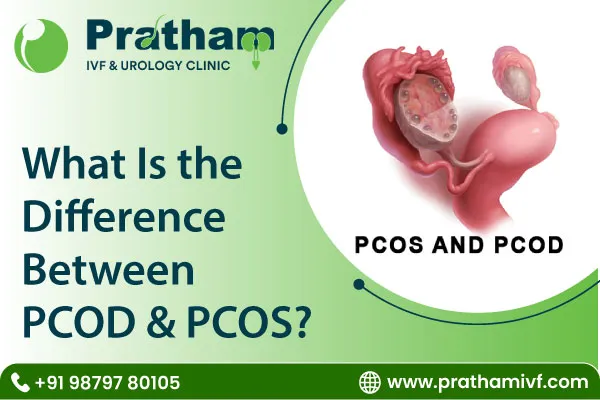
PCOD (Polycystic Ovarian Disease) and PCOS (Polycystic Ovarian Syndrome) are two common hormonal disorders that affect women, but they are not the same. In PCOD, ovaries release immature or partially mature eggs, which can lead to cyst formation. It is primarily a lifestyle disorder and can often be managed through proper diet and exercise. On the other hand, PCOS is a more serious endocrine disorder where the hormonal imbalance affects ovulation, causes irregular periods, weight gain, excessive hair growth, and can lead to infertility. Women with PCOS usually have higher levels of androgens (male hormones), which disrupt the normal menstrual cycle.
While both conditions involve cysts in the ovaries, PCOS has more severe metabolic and hormonal implications. Early diagnosis and proper management can help women lead a healthy life and improve fertility outcomes in both conditions.
Understanding PCOD and PCOS
PCOD and PCOS sound similar but differ in severity and underlying causes. PCOD is often a milder, more lifestyle-related condition, while PCOS is a complex endocrine disorder tied to significant metabolic risks. Grasping these differences is vital for effective diagnosis, management, and preserving fertility.
1. Understanding PCOD
- Definition & Causes: PCOD involves irregular release of immature eggs and mild hormonal imbalances. It's often influenced by lifestyle factors.
- Symptoms: Common signs include irregular periods, mild weight gain, acne, and occasional infertility.
- Diagnosis & Treatment: Diagnosed via ultrasound and hormone tests. Treatment focuses on lifestyle changes—diet, exercise, and sometimes medications.
2. Understanding PCOS
- Definition & Causes: PCOS is a more serious endocrine condition involving high androgen levels, insulin resistance, and systemic hormonal disruption.
- Symptoms: Irregular or absent periods, excessive hair growth, acne, weight gain, and fertility challenges are common. PCOS also increases the risk of diabetes, heart disease, and metabolic dysfunction.
- Diagnosis & Treatment: Diagnosis follows criteria such as ovulatory dysfunction, high androgen levels, and polycystic ovaries on ultrasound. Treatment includes lifestyle changes, insulin-sensitizing medications, hormonal regulation, and fertility treatments as needed.
3. Key Differences at a Glance
| Feature | PCOD | PCOS |
|---|---|---|
| Hormonal Imbalance | Mild, often lifestyle-induced | Significant, including insulin resistance and hyperandrogenism |
| Ovarian Cysts | Follicles develop, and eggs may be released | Multiple retained follicles, often unruptured |
| Menstrual Irregularity | Occasional or mild disruptions | Frequent, severe irregularities or absent cycles |
| Fertility Impact | Less severe, more often responsive | Higher infertility risk, often requiring medical help |
4. Common Misconceptions
- Myth: PCOD and PCOS are the same.
Fact: PCOS is more severe and has greater long-term health risks. - Myth: Only overweight women get PCOD/PCOS.
Fact: Both conditions can affect women across all sizes and backgrounds. - Myth: Ovarian cysts mean PCOS.
Fact: Cysts alone don't define the syndrome; other hormonal and metabolic criteria apply.
Treatment for PCOD & PCOS
Managing PCOD (Polycystic Ovarian Disease) and PCOS (Polycystic Ovarian Syndrome) involves a combination of medical care and lifestyle changes to control symptoms, improve hormonal balance, and boost fertility.
- Lifestyle Changes: Adopting a balanced diet, regular exercise, and weight management helps regulate periods and reduce insulin resistance.
- Hormonal Medications: Birth control pills or hormone-regulating medicines can help manage irregular periods, acne, and excess hair growth.
- Fertility Treatments: If natural conception is difficult, treatments like ovulation induction, IUI, or IVF may be recommended.
- Managing Metabolic Risks: Monitoring blood sugar, cholesterol, and blood pressure is important.
- Cosmetic Treatments: Laser hair removal and skin care therapies for unwanted hair and acne.
- Emotional Support: Stress reduction, counseling, and emotional care are vital.
5. Managing Your Lifestyle for PCOS/PCOD
- Healthy Diet & Exercise: A low-glycemic, whole foods diet and regular exercise help regulate hormones and weight.
- Stress Management: Stress worsens insulin resistance and hormonal imbalance—practices like yoga, meditation, and adequate sleep help.
- Supplement Support: Supplements like myo-inositol and vitamin D may offer support, although medical guidance is key.
Why Choose Pratham IVF Center for PCOD & PCOS Treatment in Ahmedabad?
When PCOD or PCOS disrupts fertility, expert care becomes essential. Pratham IVF Center, a leading fertility clinic in Ahmedabad, delivers personalized, success-driven treatment for both conditions.
- Comprehensive Diagnosis: Detailed evaluations to identify PCOD or PCOS accurately—key for building effective treatment plans that address both hormonal and reproductive concerns.
- Tailored Treatment Plans: Customized to manage symptoms or pursue conception, whether through medication, lifestyle changes, or advanced fertility treatments like ovulation induction and IUI.
- Fertility Support: From ovulation induction to IVF, our fertility specialists provide focused care for both female and male infertility, improving your chances of successful conception.
- Ongoing Care & Emotional Support: Long-term health management, lifestyle guidance, and emotional support are offered throughout the journey for complete wellness and peace of mind.
Pratham IVF Center combines expertise, compassion, and innovative technology to offer the most trusted PCOD & PCOS Treatment in Ahmedabad. As the best IVF center in Ahmedabad, we are committed to helping you overcome hormonal imbalances and achieve your dream of parenthood.
Conclusion
Understanding the distinction between PCOD and PCOS is essential for effective management and preserving reproductive health. While PCOD is milder and often lifestyle-responsive, PCOS is a complex syndrome requiring comprehensive care. With proper diagnosis, lifestyle adjustments, and professional support, individuals can manage symptoms, protect fertility, and improve overall health.
Book an appointment today the best PCOD & PCOS treatment in Ahmedabad at Pratham IVF Center. Contact us directly at +91 98797 80105, prathamivf@gmail.com
 Ahmedabad Top Rated IVF Center
Ahmedabad Top Rated IVF Center




